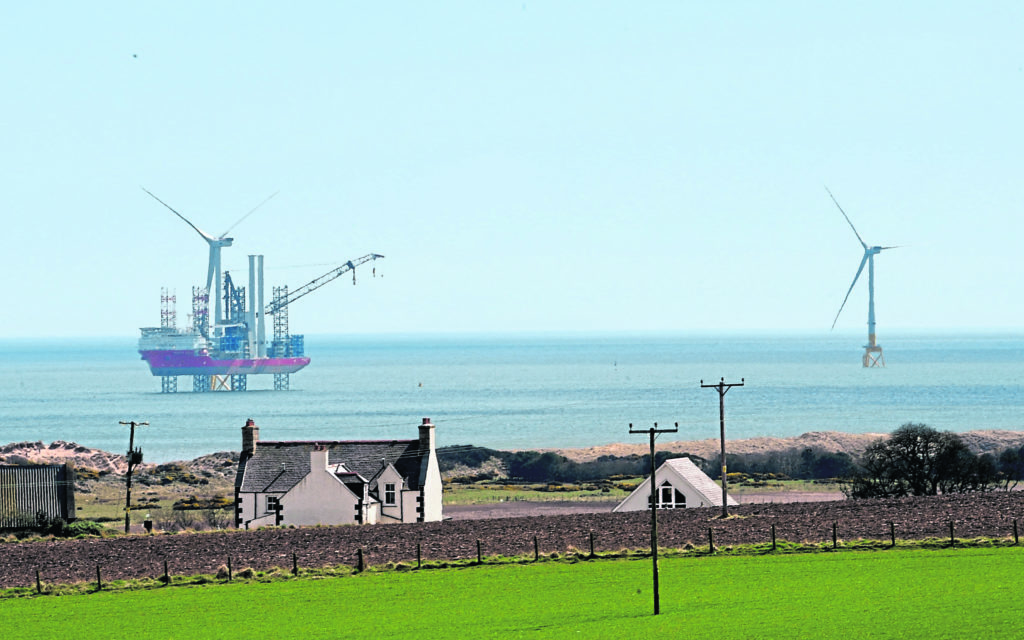
Squaring the Brexit circle amid so much political uncertainty is causing a noticeable smattering of anxiety across Scotland’s renewable
energy sector.
With so many big projects currently operating or under construction here, people are understandably concerned that a poorly executed exit from the European Union could see the sector pull up lame before it has even passed the first post.
The huge Beatrice Offshore Windfarm is one of the biggest projects in Scottish infrastructure history, while Orkney-based Orbital Marine Power’s tidal turbine smashed all industry records last year.
Big developments are also on the books with the Moray East Offshore Windfarm, the Kincardine floating wind project and Simec Atlantis Energy’s MeyGen tidal array at various stages of planning, construction or expansion.
The Scottish Government’s economic and community development agency, Highlands and Islands Enterprise (HIE), fears the UK’s withdrawal from the EU has the potential to “diminish Scotland’s position” as a global renewable energy force through a lack of availability of funding, access to quality labour and the securing of a continued and effective supply chain.
Audrey MacIver, HIE’s director of energy and low carbon, describes access to skilled labour and specialist services as “key” to Scotland’s ability to be competitive in any future renewables marketplace, while ensuring Brexit doesn’t result in ballooning costs throughout
the sector.
As an industry still operating in a relative phase of infancy, Ms MacIver worries that with renewable energy projects in Scotland being “high risk, lower-margin developments” its essential that supply chain firms are able to trade easily across borders, especially given the Scottish renewable industry’s recent history of working so successfully with its European neighbours in this area.
With access to investment playing such a large part in Scotland’s triumph to date, evidenced by the £35 million EU funding provided for Aberdeen’s 11 turbine European Offshore Wind Deployment Centre, which came online last year, Ms MacIver is anxious about where future funding streams might spring from.
She said: “Availability of funding for infrastructure, innovation, research and development (R&D) is critical to maintain momentum in world-leading developments, particularly marine energy, energy storage, and local energy systems.
“Should access to such funds be diminished, Scotland’s lead in these areas could potentially be diminished.
“For example, the European Marine Energy Centre (EMEC) in Orkney has been highly successful in securing EU funds, which has supported infrastructure development, enabled marine energy device developers to undertake successful testing regimes, and helped advance our knowledge and understanding of hydrogen as an alternative green energy source.”
In a sector so dependent on fresh investment, it’s striking how intrinsically tied the concept of political certainty and new funding are to any industry, nevermind one only just realising its potential.
Adam Forsyth, alternative energy and resource research efficiency analyst at Cantor Fitzgerald, isn’t quite so gloomy – but claims that it’s the swirling uncertainty surrounding Brexit that could cause developers to look elsewhere.
He said: “The question is will an investor see a different level of return from a project in the future? But people still need power and the underlying demand should still be there in the market.
“You might find the cost of a project is higher so therefore the return in the project becomes a little bit lower. But given that we are sitting in a period of uncertainty, not knowing the details, you also have the countervailing pressure of that uncertainty, not knowing what new world we’re in.
“Once we have certainty, it should make people look towards investing once again.”
Yet just last month, Shell’s executive vice president for new energy, Mark Gainsborough, said his firm didn’t see Brexit as a barrier to investment in the growing UK offshore wind market.
He suggested that, come what may, after Britain’s exit from the EU, Mr Gainsborough’s firm would not be “dampened” in it’s enthusiasm, adding that it is more important for Shell that there “continues to be supportive government policies”.
While some investors might not necessarily be put off by the prospect of Brexit, the Scottish Government is perhaps understandably aggrieved that deals and relationships built up over many years will be “threatened” by political change they don’t want.
Renewable energy has been a increasingly glistening jewel in the current administration’s tenure in Scotland and any potential impact is met with resistance in what they view as a “chaotic” exit from the EU.
A spokesman for the Scottish Government said: “While we remain committed to delivery of Scotland’s Energy Strategy, the impacts of Brexit-related uncertainty are likely to be amplified in Scotland’s renewable energy sector because of the very important role that energy plays in our economy – as it is a key driver of economic growth.
“EU funding supports projects in the pursuit of new, low carbon technologies enabling infrastructure such as offshore wind and marine renewables, and the Beatrice Offshore Wind Farm was the largest single recipient of European Investment Bank funding.
“Losing access to these funding streams, such as Horizon 2020 or marine energy resources, would undoubtedly have an effect on the scale and quality of energy research, innovation and investment.
“A hard Brexit could potentially cause harm to the sector’s supply chain and skills base – jeopardising its future deployment and economic benefit in Scotland.”
Whatever the political stripes or affiliations of firms currently working in the Scottish renewables sector, it appears that anything which could halt the recent strong progress of the industry is met with deep suspicion.
Yet the biggest perceived nightmare for many in the sector is the possibility of exiting the EU without a deal – potentially tearing asunder numerous trade deals and lucrative relationships.
To the renewable energy sector that means no new projects and a hemorrhaging of talent to other countries.
It could also mean Scotland losing its place as a world leader in green energy.
RenewableUK’s deputy chief executive director Emma Pinchbeck said: “We are world leaders in wind and marine energy, building vital new capacity to keep the lights on while slashing carbon emissions.
“A disorderly exit would risk disrupting supply chains and would undermine our ability to continue to reduce costs to consumers.
“Departing from the EU without a deal would jeopardise investment and jobs in the UK’s cutting-edge renewable energy industries.”
Recommended for you

